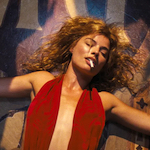 There’s a surprising amount of shitting, pissing, and puking in BABYLON, the bawdy fictionalized-early-Hollywood period comedy-drama from writer/director Damien Chazelle (writer of THE LAST EXORCISM PART II). It opens with hard-working studio assistant Manny Torres (Diego Calva, Narcos: Mexico) trying to impress his bosses by helping organize a crazy mansion party/orgy, and he has to figure out how the fuck to get a rented elephant up a hill. While pushing the way-too-small truck, the elephant gets spooked, and the wrangler (Jimmy Ortega, “Sicario #1,” SABOTAGE) is graphically showered with feces from above.
There’s a surprising amount of shitting, pissing, and puking in BABYLON, the bawdy fictionalized-early-Hollywood period comedy-drama from writer/director Damien Chazelle (writer of THE LAST EXORCISM PART II). It opens with hard-working studio assistant Manny Torres (Diego Calva, Narcos: Mexico) trying to impress his bosses by helping organize a crazy mansion party/orgy, and he has to figure out how the fuck to get a rented elephant up a hill. While pushing the way-too-small truck, the elephant gets spooked, and the wrangler (Jimmy Ortega, “Sicario #1,” SABOTAGE) is graphically showered with feces from above.
I appreciate that it’s a surprisingly JACKASS way to kick off a movie some had purported to be Oscar bait, but it’s narratively odd. It must be intended to establish the lowest-of-the-low start to Manny’s career in the movie industry, but he doesn’t seem to get any on him, so it kinda seems like stolen valor to me. Shouldn’t the wrangler be the one getting the meteoric rise? Oh well. Maybe that’s the sequel.
This party scene could be a short film unto itself, and it introduces each of the characters whose ups and downs we’ll be following throughout the movie, chief among them Nellie LaRoy (Margot Robbie, THE LEGEND OF TARZAN), an aspiring starlet from New Jersey who’s not on the guest list, but Manny takes pity on her and sneaks her in. She peer pressures him into doing a line with her and they have a vulnerable moment that will connect them for life, sharing their Hollywood aspirations.
Nellie likes to describe being a star as some innate quality that you either have or you don’t, and she has it. It’s a philosophy that’s hard to argue since Robbie is right there on screen clearly having it. Nellie is a nobody who sweeps in and becomes the center of attention right in the middle of Hollywood’s elite and some kind of Mardi-Gras-by-way-of-EYES-WIDE-SHUT shindig. There’s a mesmerizing long take that follows her dancing, being carried, smoking, collapsing, and getting up to dance again. The choreographer is Mandy Moore, but I looked it up, it’s not that one. (It’s the one that did some David O. Russell movies, LA LA LAND, and some award shows.)
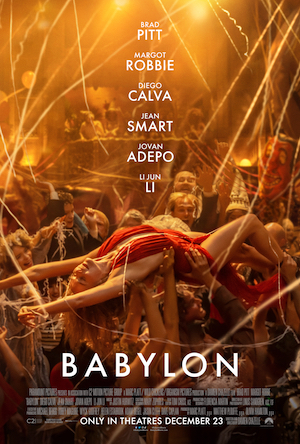 Calva is good as Manny, but I’m not yet convinced he has that star thing. Maybe he’ll grow into it in defiance of Nellie’s theory. When Nellie dances lustily with Manny before suddenly twirling away and ignoring him I absolutely bought that he would both know she was trouble and fall irrevocably in love with her, swooning every time that night or throughout the years that she sees him, says his name, reveals that she remembers he exists. He spends some intimate, life-changing time with her at the party and then watches from a distance like a bystander as her dream they discussed comes true. A gruff studio executive (played by Flea!) spots her across the room, points, and suddenly she’s the replacement for a bit player who will not be attending tomorrow’s shoot due to a fatal overdose after peeing on a silent comedy star (Troy Metcalf, “Blue Collar Guy,” SPIDER-MAN 2). (The allusion to the Fatty Arbuckle scandal is a poor choice, in my opinion.)
Calva is good as Manny, but I’m not yet convinced he has that star thing. Maybe he’ll grow into it in defiance of Nellie’s theory. When Nellie dances lustily with Manny before suddenly twirling away and ignoring him I absolutely bought that he would both know she was trouble and fall irrevocably in love with her, swooning every time that night or throughout the years that she sees him, says his name, reveals that she remembers he exists. He spends some intimate, life-changing time with her at the party and then watches from a distance like a bystander as her dream they discussed comes true. A gruff studio executive (played by Flea!) spots her across the room, points, and suddenly she’s the replacement for a bit player who will not be attending tomorrow’s shoot due to a fatal overdose after peeing on a silent comedy star (Troy Metcalf, “Blue Collar Guy,” SPIDER-MAN 2). (The allusion to the Fatty Arbuckle scandal is a poor choice, in my opinion.)
Also at the party is already-Hollywood-royalty Jack Conrad (Brad Pitt, CUTTING CLASS), whose wife (Olivia Wilde, TRON LEGACY) leaves him out front because he won’t stop faking an Italian accent. At least he’s better off than his sadsack best friend and producer George Munn (Lukas Haas, THE REVENANT), who is currently (and usually) pulverized by the rejection of a woman. At the end of the night Manny is assigned to drive Jack’s drunk ass home; Jack takes a liking to him, hires him as an assistant, and he begins his climb to studio executive the next morning.
At the party we also see Chinese-American cabaret singer Lady Fay Zhu (Li Jun Li, Wu Assassins) blow the roof off the place with a lesbian-Jessica-Rabbit number called “My Girl’s Pussy.” She’s a goddess on the party scene and on the studio lot she’s the lady who paints the titles.
Most of Chazelle’s movies have been about musicians. LA LA LAND centered on a jazz pianist, WHIPLASH was the cruel tutelage of a jazz drummer, he even wrote the thriller GRAND PIANO, about a sniper threatening to shoot a concert pianist if he gets one note wrong on a supposedly unplayable piece. The director’s lesser-known first film GUY AND MADELINE ON A PARK BENCH follows a young jazz trumpeter, and its most memorable scene is a live-to-film music and dance number that pops off at a party in a cramped apartment.
I love seeing the ambitions of that $60,000 black and white 16mm indie balloon into this opulent $78 million film from Paramount, filled with long scenes and complex camera moves, through crowds of extras, crazy shit going on everywhere like a scene out of Where’s Waldo. Always somebody in the background taking a piss or getting thrown through a window or dangling from a balcony with their pants down. In the middle of it all the big band never stops playing, people never stop dancing, clapping, chanting.
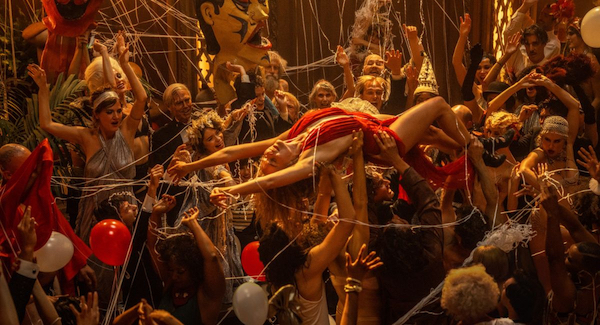
The musicians are the backbone of the party and the movie, but they’re the hired help to most of the characters we’ve met. When the film checks in for a few conversations with the band I didn’t realize it was establishing trumpet player Sidney Palmer (Jovan Adepo, FENCES) to become a bigger part of the plot later on. I could’ve used more of him.
The music is composed by Chazelle’s college-roommate-turned-composer Justin Hurwitz, as you’ll recognize if you’ve seen their other movies, especially LA LA LAND. It’s more of an expressionistic riff on the subject matter than a period piece, crashing together jazz and circus music, played by a 100-piece orchestra with wild background noise and off mic singing and chanting. Musically the vibe is like a wild, partying big band jamming on Louis Prima’s “Sing Sing Sing (With a Swing),” but sometimes disintegrating into a quiet lament from PUNCH-DRUNK LOVE, then building back up again. I also thought of THE UMBRELLAS OF CHERBOURG because of the way so much of the score sounds like one long song repeated in different styles and instrumentation.
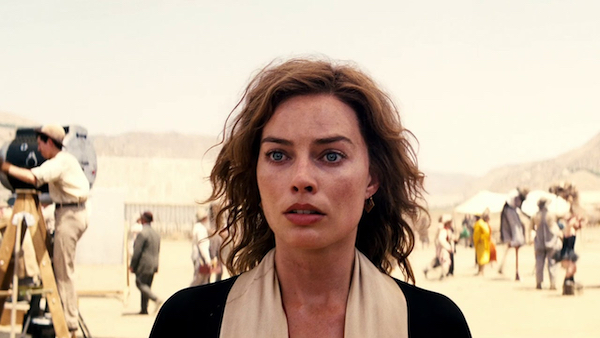
In the light of the next day some of the coaches turn back into pumpkins. Nellie and her party dress return to much danker living conditions than their aura of glamour imply. Fay helps out at her parents’ laundromat (but stuns a customer who recognizes her and gets an autographed photo).
But the film shoot is about as crazy as the party. It’s out on a dirt field somewhere but it’s that classic conceit of scenes set on studio backlots where the camera roams through a wide variety of overlapping productions and behind the scenes shenanigans (think PEE-WEE’S BIG ADVENTURE). Manny quickly goes from the new guy Jack Conrad brought with him for reasons unknown to riding a horse firing a pistol to intimidate a revolting crowd of homeless men hired to play soldiers. And then he makes a harrowing, movie-saving drive to town to find a backup camera. There are a bunch of shots in this movie of bouncy early automobiles janglingly hauling ass down dirt roads.
Jack huddles in a tent making phone calls to possible co-stars and casually dodging errant spears from the battle scene filming outside (one of the actors is not as lucky). The out of control war movie is directed by a Preminger-like madman just called Otto. Right before he left the movie I realized he was played by Spike Jonze.
You see what I’m saying? You don’t expect to see Flea, you don’t expect to see Lukas Haas, you don’t expect to see Spike Jonze. Later Eric Roberts (BEST OF THE BEST) shows up in an actually pretty significant role as Nellie’s dad/manager (who inspires her to fight a rattlesnake). And I guess I didn’t recognize Patrick Fugit (ALMOST FAMOUS) or Joe Dallesandro (FLESH FOR FRANKENSTEIN). And Lewis Tan (MORTAL KOMBAT, FISTFUL OF VENGEANCE) is in there somewhere?
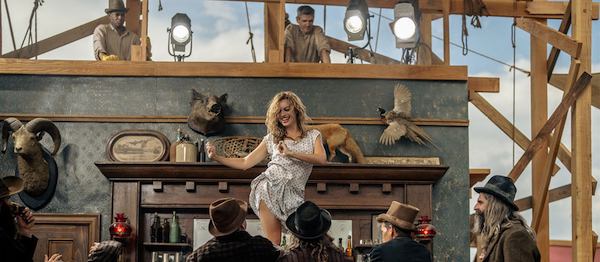
This first day on the job terrifies Nellie, but then the camera rolls and she knocks her bit part as a bartender out of the park, around the earth and back into the park, and does a spider-man catch to get herself out. She improvises a dance, cries on cue, impresses the hell out of the director (Chazelle’s wife Olivia Hamilton), and makes an enemy of the film’s lead (Samara Weaving, THE BABYSITTER). It’s funny to see both of the blonde Australian funny and hot it-girls that popped up very suddenly in the aughts finally in the same movie, fighting each other for the spotlight.
Between her natural talent, her wild party girl persona (both on and off screen) and the support of gossip columnist Elinor St. John (Jean Smart, THE ACCOUNTANT), Nellie becomes a phenomenon. She’s a superstar when Manny runs into her on a trip to New York, but she’s excited to see him. She takes him into her limo and on a trip to an asylum to visit her mother (Vanessa Bednar, “Hot Pool Model,” VEGAS VACATION), a whirlwind spontaneous hangout like they’re life long best friends. He was sent there to see the premiere of THE JAZZ SINGER, during which his mind is clearly floating blissfully through Nellieland, but when he sees the crowd’s response at the end he runs to call home and tell them everything’s about to change.
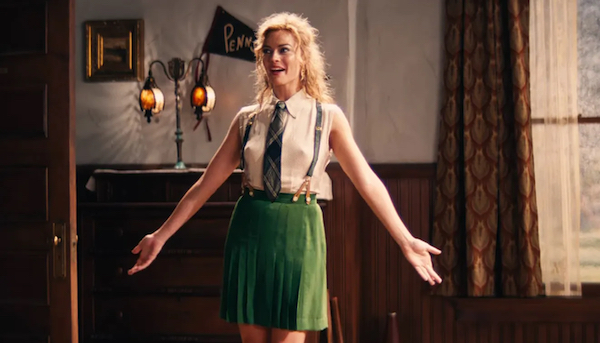
The most intense section of the movie is a long, painful sequence about the difficulties of shooting movies with sound. Nellie has to do what seems like a simple scene, but she’s interrupted over and over and over as her shoes are too loud or her voice blows the mic or somebody coughs or you name it. Everyone’s increasingly on edge and sweaty (they can’t use fans or air conditioning because of the noise). When they finally get through the shot they all celebrate like they just blew up the Death Star, but your stomach clenches dreading what the catch is.
I heard BABYLON described as “like BOOGIE NIGHTS except for the transition to sound, instead of video,” which seemed silly to me, since SINGIN’ IN THE RAIN was already that (and is explicitly referenced here). But come to think of it that soundstage horror show kinda has the mania and tension of the drug deal scene in BOOGIE NIGHTS, a scene that no doubt is a direct influence on the feverish, dangerous sequence later on where Manny and studio drug dealer The Count (Rory Scovel, I FEEL PRETTY) meet with infamous weirdo gangster James McKay (Tobey Maguire, THE GREAT GATSBY) to pay off Nellie’s gambling debts. Ethan Suplee (THE TRUST) plays a scary bodyguard whose repeated loogie-spitting has a grating/disconcerting effect similar to the kid throwing the firecrackers in BOOGIE NIGHTS. So now it seems there’s a feedback loop mixing together the mythology of Old Hollywood and ‘70s porno. Hey, why not?
What I haven’t really established is that the movie is legitimately funny at times. Pitt is mostly in comedy mode, with some physical humor and great lines like when he assures George, who’s in public with a toilet seat stuck around his head and arm (long, sad story), that it doesn’t look that bad.
And Nellie works broadly as an agent of chaos striking against the bourgeoisie. Does The Man quiver in his boots at the class war implications of the scene where drunken Nellie gives up on trying to fake sophistication at a Hearst Mansion party, pretends to wipe her ass with some lady’s mink and knocks over a bunch of food? No. Is it funny that after storming out and falling to her knees to puke she manages to hold it in long enough to go back inside and aim at the rich people? Yes, I’m afraid so.
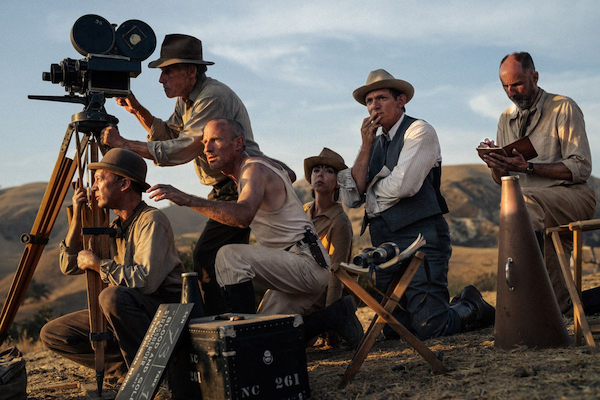
Chazelle is still in his thirties and has only directed five movies, but two of them were kinda dorky movies trying to talk about art in an entertaining way, that became outsized hits and awards season bigshots. Consequently there are those who really need you to know how emphatically they look down their noses at his movies and anyone who watches them with their noses held fairly level. With BABYLON those people got to form a super team with the narcs who think it’s a bad thing for a director to take a bunch of money from a studio to make a big expensive movie that’s kinda weird and crazy and unlikely to make a profit – fantasy board members, box office trainspotters, Cinemascore true believers, Razzie voters and the like.
Sure enough it flopped at the box office, got some very negative reviews, and despite being about
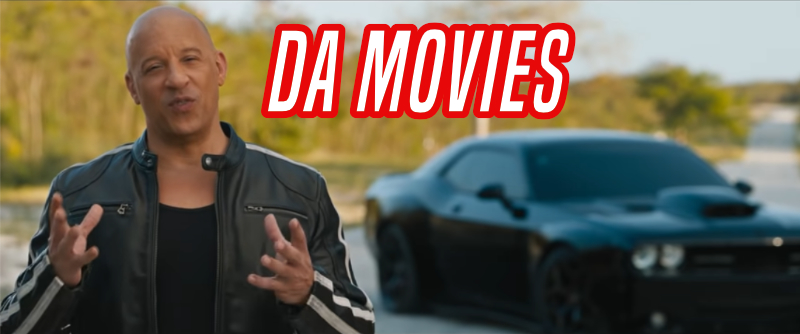
and starring some of Hollywood’s best and brightest it’s now official that it didn’t get any of the big Oscar nominations people assume it was reaching for. (It did get production design, score and costumes design nominations.) I’m glad that was out of the way before I finished my review because now we can forget about all that extraneous bullshit and talk about the actual movie, which is not for everybody, but is for me. I had a great time.
I understand why someone would think it was Oscar bait, what with its subject matter, but the emphasis on bodily fluids says otherwise. So does the fever dream third act where they enter a literal Los Angeles underworld and encounter a live crocodile, the motherfuckin Elephant Man (Coffin Baby from Tobe Hooper’s TOOLBOX MURDERS woulda made more sense) and a masked muscleman (Douglas Fruchey) in a torch-lit dungeon who eats live rats for money. McKay excitedly describes this geek straight out of the sewers of Stallone’s COBRA the same way Nell described herself: “You either are a star or you aren’t, and he is one!”
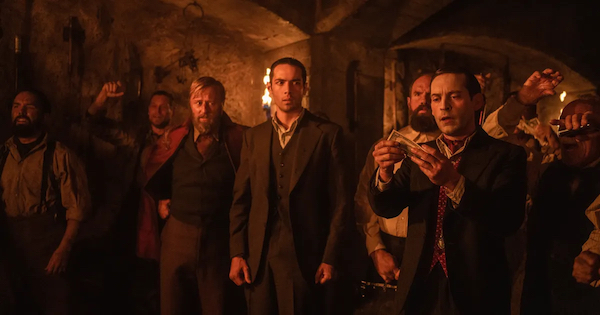
BABYLON is easily Chazelle’s biggest swing and messiest and most indulgent movie. But I like that sort of thing. In a way it reminded me of another supposed misfire I kinda enjoy, Steven Spielberg’s 1941. It involves way more melancholy and tragedy, but it has that combination of excessive spectacle and broad, silly humor. Personally, I enjoy those rare occasions when a skillful director gets to throw production value around like Jackson Pollock threw paint. If you hate it that’s fine, that’s normal, but I don’t see why you’re bragging about it, it doesn’t make you that cool. Try sunglasses or something. Or like a cool walk, maybe.
I think I grew out of most of my cynicism at some point, but many people don’t, so it makes sense for them to hate Chazelle. One level of his movies is him and his characters being shamelessly corny and heart-on-their-sleeves about isn’t music beautiful, isn’t L.A. beautiful, aren’t movies magical, can you believe how good jazz is, isn’t love nice? (FIRST MAN is pretty bleak, though. It’s about a guy who goes all the way to the moon just so he can be left the fuck alone for a bit.)
BABYLON ends on the corniest note of anything I saw last year – an attempt at a CINEMA PARADISO style celebration of the power of film that for me is totally laughable and misjudged. Luckily in this particular movie it doesn’t feel like a disappointing stain on what came before it. It made me want to laugh and ruffle the movie’s hair and say “Look at you, you big old goofball!”
But I do think it’s a movie about more than that. It depicts California of the silent era as a literal Wild West of danger and hedonism – Uncle Boris from THE FABELMANS might as well have a cameo training lions – but also a place where the gatekeepers hadn’t yet shown up to stop the outsiders from climbing on stage. After the advent of sound suddenly Nellie’s Jersey accent is an issue, her relationship with Fay is a problem for publicists, Fay loses her voice because they don’t need her to paint titles. Manny strategically plays down his Mexican heritage, and although he really cares about movies and these people he pretty much fails all of them, because that’s the business. He gives Sidney a film career, but Sidney has too much integrity to continue after Manny has him cork his face to make sure people in the south can tell the whole band is Black, they’re not integrated. That’s a pretty good illustration of why things tend to go wrong if they get too big. Trying to appeal to the broadest possible audience can mean trying to appeal to a bunch of assholes.
But that doesn’t mean that the reverse is true, that BABYLON, by not trying to appeal to the broadest possible audience, repels assholes. It repels people in general, it seems. Their loss. I sincerely enjoyed it, but also these days, more than ever, I appreciate artists making things that would cause focus groups to explode on contact. The more expensive the better.
Anyway, gotta go, I’m gonna go fight a snake.
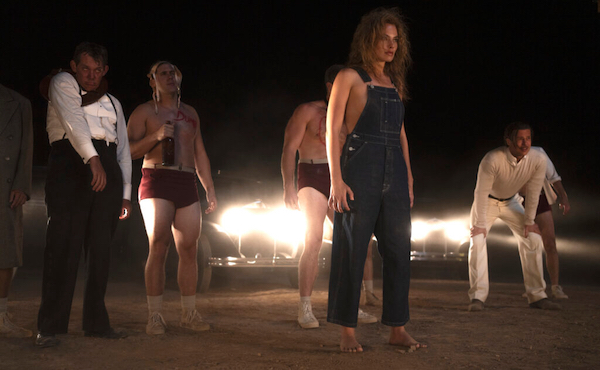
P.S. SPOILER I GUESS – yeah that was weird that they used the clip of AVATAR in the montage, I don’t know what to make of that. But I’ll tell you this, if they’d had clips of BLADE or THE TEXAS CHAIN SAW MASSACRE I would’ve liked the movie even more. Also I wish they used a clip of the Neil Diamond version of THE JAZZ SINGER.
P.P.S. They should do a sequel about Spike Jonze playing a Mr. Freeze-like villain on a Batman-like TV show.


























January 30th, 2023 at 8:11 am
I agree with much of what you wrote, and I did enjoy the film, but I also found it a little. . .weird that Chazelle sets his fable of the chaotic, dog-eat-dog Wild West of Hollywood in 1927, of all years. Cinema, and American Cinema in particular had, by then, long established itself as a worthwhile artistic medium full of geniuses and theorists, in equal measure. 1927 was the year of Murnau’s SUNRISE, Keaton’s THE GENERAL, Wellman’s WINGS, and – in the rest of the world – Gance’s NAPOLEON and Lang’s METROPOLIS. It was a giant year for the medium, and – while there was excess and scandal, per Kenneth Anger’s HOLLYWOOD BABYLON, which the film refers to – to portray the medium of the era as just a bunch of rich goofballs with stars in their eyes betrays what was actually happening then.